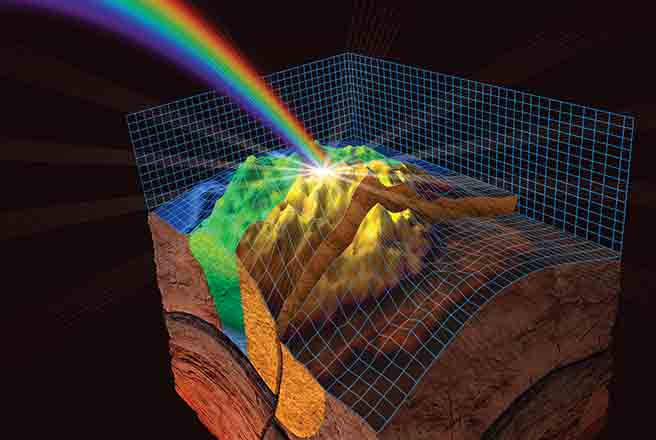Experience your reservoir like never before.
ADIPEC Awards Recognize Schlumberger Fellow Oliver Mullins With Lifetime Achievement Award
Published: 12/18/2020

ADIPEC Awards Recognize Schlumberger Fellow Oliver Mullins With Lifetime Achievement Award
Published: 12/18/2020

In the wireline industry, there are a few names that stick out. Oliver Mullins is one of them. He literally wrote the book—several in fact—on reservoir fluid analysis.
This year, the Abu Dhabi International Exhibition and Conference (ADIPEC) Awards recognized Mullins with the first-ever Lifetime Achievement Award for Outstanding Technical Excellence to the Oil and Gas Industry. The Awards ceremony, held virtually on November 9 due to the COVID-19 pandemic, recognizes excellence in 10 categories across the global oil and gas industry.
Related: ADIPEC 2020 Highlights
“I’m extremely humbled and honored to be recognized by ADIPEC for my life’s work,” said Oliver Mullins, Schlumberger Fellow, during a virtual interview. “There are so many brilliant men and women who’ve advanced our industry through their technical contributions and who could’ve been selected for this recognition.”
During his 34-year career, all with Schlumberger, Mullins blazed new trails in reservoir evaluation, providing the industry with innovative strategies and techniques for improving reservoir understanding and performance.
Mullins said the fork-in-the-road moment in his career came when he was working on fluid identification in oil/water/gas. From his research, he concluded that downhole crude oil analysis could be done and might be very useful for reservoir characterization purposes.
“I had questions that I needed to answer for myself,” said Mullins. “Did I want to follow and create the value of those measurements to the field and was this even necessary or were the measurements of obvious utility for reservoir characterization?”
After confirming with industry colleagues that fluid measurements were not being used for reservoir characterization, and they indeed could be very useful, Mullins made the decision to press forward with putting his research into practice in a real-world environment. However, he had to begin his journey by expanding on his formal training and experience beyond chemistry to learn more about reservoirs and key production issues. By combining his classical training in chemistry with a structural understanding of the reservoir, Mullins laid the foundation of his work, which he notes has three major themes:
- Reservoir Fluid Geodynamics (RFG)
- The Yen-Mullins Model
- Downhole Fluid Analysis (DFA).
Reservoir Fluid Geodynamics
This recently introduced technical discipline is based on asphaltene thermodynamics and accounts for postdepositional changes of reservoir hydrocarbons, such as tar formation. RFG analysis of asphaltene gradients provides previously inaccessible insights for field development planning. Mullins’ book, Reservoir Fluid Geodynamics and Reservoir Evaluation, includes 18 oilfield case studies delineating optimal production with RFG.

Enabling technology for RFG includes the intelligent wireline formation testing platform, Schlumberger’s latest formation testing technology. This platform provides routine and efficient measurement of reservoir fluid gradients allowing their thermodynamic characterization and thereby enabling real-time RFG evaluation during wireline logging jobs. The platform has been recognized within Schlumberger by CEO Olivier LePeuch for its material impact for the company and Schlumberger’s customers as well as through various industry awards.
New RFG workflows coupled with traditional geology workflows enable, for the first time, the development of “GeoScenarios”, which are the sequence of events, both rock and fluids, that occur in the reservoir in geologic time. Such GeoScenarios greatly improve reservoir evaluation.
In 2020, Mullins received the SPE International Reservoir Description and Dynamics Award in large part based on RFG. This award recognizes outstanding achievement or contributions to the advancement of petroleum engineering in the area of reservoir technology.
The Yen-Mullins Model
The Yen-Mullins model resolves the nanostructures of asphaltenes, which resulted in the industry’s first thermodynamic equation for asphaltene gradients in reservoirs. Mullins and collaborators utilized many advanced chemical measurements applied to asphaltenes, including time-resolved molecular diffusion, unimolecular decomposition, mass spectrometry, atomic force microscopy, X-ray spectroscopy, high-Q ultrasonics, and many others. This is described in three coedited books, Asphaltenes, Heavy Oils, and Petroleomics; Structures and Dynamics of Asphaltenes; and Asphaltenes: Fundamentals and Applications, and various publications with research institutions.
For his contributions to the Yen-Mullins Model, The American Chemical Society gave Mullins the George A. Olah Award for Hydrocarbon or Petroleum Chemistry in 2018.
Downhole Fluid Analysis
Mullins is the primary originator of downhole fluid analysis or DFA, described in his DFA book, The Physics of Reservoir Fluids: Discovery Through Downhole Fluid Analysis. DFA addresses the twin failed and overly optimistic assumptions that oil reservoirs consist of "one giant tank of one homogeneous hydrocarbon." DFA naturally finds compositional gradients and identifies compartments by simple new methods. Moreover, DFA offers novel ways to establish reservoir connectivity with new data streams not previously encountered in reservoir reconnaissance.
Many of his 135 US patents are DFA inventions. Mullins received the SPWLA Gold Medal for Technical Achievement in 2015 in large part due to DFA.

“I represent an army of dedicated and skilled technologists, many of whom work for Schlumberger,” said Mullins. “I’ve had the distinct pleasure over the years of working with many brilliant men and women to bring our shared vision to reality, and I’m very grateful to Schlumberger for providing me with the opportunity to pursue my dreams.”
Mullins began his career with Schlumberger as a research scientist at the Schlumberger-Doll Research Center in 1986. Prior to joining Schlumberger, he received his doctorate in chemistry from Carnegie-Mellon University and held two post-doctoral positions, one in chemistry at the University of Chicago and one in physics at the University of Virginia.
“I obtained my real science education from my father who was a famous physicist. He taught me the love of science and displayed the passion of doing science. He combined collegiality among coworkers with unremitting intensity to discover the workings of nature. I can only hope I honor his legacy and that of my mother who was a professor of special education, her life’s mission.”
Originally from Pittsburgh, Mullins, who lives and works in Houston, continues to provide insights to Schlumberger clients through his work on resolving mysteries of reservoirs. When he’s not on the clock, Mullins enjoys skiing, biking, scuba diving, and spoiling his grandchildren.
“Throughout my career, my family, friends, and colleagues have been a tremendous support and encouragement,” Mullins continued. “This award reflects an enormous team effort.”

